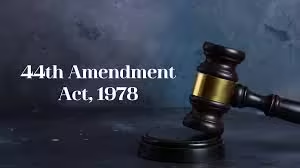The 44th Amendment to the Constitution of India, enacted in 1978, was a significant legislative response to the excesses and abuses witnessed during the Emergency period (1975-1977). This amendment aimed to restore and safeguard democratic principles and civil liberties that had been undermined during the Emergency. Here are the key aspects and provisions of the 44th Amendment:
Key Provisions of the 44th Amendment
- Restriction on the Power to Proclaim Emergency:
- The amendment made it more difficult for the government to declare a National Emergency (Article 352). It required that such a proclamation must be made only on the basis of a written recommendation by the Cabinet.
- The duration of an emergency proclamation was limited to one month unless approved by both Houses of Parliament. For continuation, the approval must be sought every six months.
- Protection of Fundamental Rights:
- The 44th Amendment restored the people’s right to challenge the government in the Supreme Court and High Courts for enforcement of Fundamental Rights (Article 359). During the Emergency, these rights were suspended.
- It introduced safeguards against the suspension of Articles 20 (Protection in respect of conviction for offences) and 21 (Protection of life and personal liberty), ensuring that even during an Emergency, these critical rights cannot be suspended.
- Rights of Property: The amendment repealed the right to property as a fundamental right (Article 31), making it a legal right under Article 300A. This was done to avoid legal challenges related to land acquisition and redistribution.
- Preventive Detention: It imposed strict limits on the executive’s power to detain individuals without trial (preventive detention). It mandated that such detention be reviewed by an Advisory Board within two months, instead of the previous three-month period.
- Safeguards Against Arbitrary Executive Actions:
- The amendment sought to ensure that certain essential freedoms could not be curtailed by the executive without substantial parliamentary oversight.
- It emphasized that the President of India could declare an Emergency only if there was an armed rebellion or external aggression.
- Parliamentary Approval and Safeguards:
- Enhanced the role of Parliament in the proclamation and continuation of an Emergency, requiring a higher threshold for approval.
- The approval of at least two-thirds of the members present and voting in each House of Parliament is necessary for continuing an Emergency beyond one month.
Impact and Significance
- Restoration of Democratic Norms: The 44th Amendment was crucial in reinstating democratic governance and protecting civil liberties in India after the Emergency. It curtailed the potential for future abuse of power by any government.
- Strengthening of Judicial Review: By restoring the right to judicial review of Fundamental Rights, the amendment reinforced the independence and power of the judiciary to act as a check on the executive and legislative branches.
- Reinforcement of Civil Liberties: The safeguards introduced for the protection of life, personal liberty, and freedom from arbitrary detention reinforced citizens’ confidence in the Constitution and the rule of law.
- Political and Constitutional Reforms: The amendment highlighted the need for continuous vigilance and reforms to protect democratic values. It underscored the importance of checks and balances in a functioning democracy.
Conclusion
The 44th Amendment to the Constitution of India stands as a landmark reform aimed at rectifying the excesses of the Emergency period. It fortified the democratic framework, ensuring that fundamental rights and civil liberties are safeguarded against potential abuses by the executive. By placing greater checks on the declaration and continuation of an Emergency, the amendment has played a crucial role in preserving the integrity of India’s democracy.

